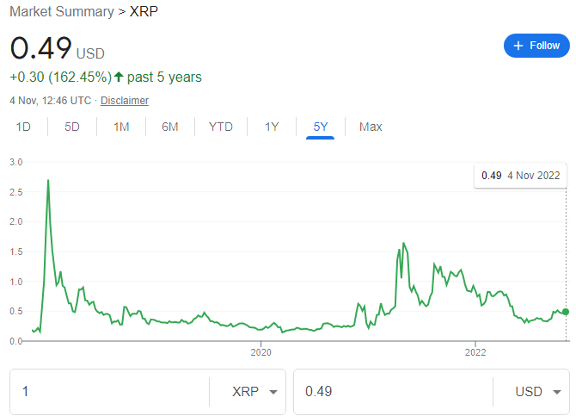The first regulatory battle to classify crypto as securities could be set for an epic showdown, or else an anticlimactic collapse.
Ripple’s XRP has popped by 8% today to $0.49, as the Kingsguard comes to the defence of the altcoin. In what may be the first real skirmish between the SEC and the wider crypto community, the regulator wants to wrestle for control against an opponent fiercely in favour of staying open and decentralised.
For the uninitiated, XRP is designed to be the most practical cryptocurrency for applications across the financial services space, with use cases including cross-border payments, crypto liquidity, and Central Bank Digital Currencies.
And despite today’s increase, XRP is still down 70% since its $1.65 high in April 2021, under attack not just from the SEC, but also from the same economic pressures facing every other crypto from Bitcoin to Doge.

However, if the SEC loses, or perhaps tanks a humiliating climbdown, XRP could soar. Of course, it a climb could come with volatility, as the regulator considers XRP only the initial battle of a larger war.
A brief precis of Ripple vs the SEC
The SEC is accusing Ripple of illegally raising money through utilising XRP as an unregistered security, while Ripple is claiming that XRP does not qualify as a security, and therefore does not come under the SEC’s purview. Importantly, the SEC claims that Ripple’s transgressions cost retail traders $15 billion.
Regular readers will know that this ‘commodities vs securities’ legal argument as a recurring theme, with Ethereum also being take to task by the SEC following the Merge, as it argues that the ability to stake tokens for ETHER rewards is a hallmark of a security and therefore falls under its regulatory control.
The wider argument of course is that cryptocurrency investments are not federally protected in the same way as equities, and therefore the SEC has no business regulating crypto if altcoins do not come with standard retail client protection. The SEC argues that it wants to offer these protections but is powerless to do so until cryptocurrencies are classified as securities.
Complicating this battleground is the decentralised nature of crypto: while individual projects may be centrally located in one jurisdiction, blockchain nodes spread across many countries makes it effectively impossible to enforce regulation at a coin level, and only at the exchange level.
This immutable fact is something the SEC is now coming to appreciate.

Who’s who in the Ripple legal case?
On one side, there’s the SEC, in arguably its first attempt to force a cryptocurrency developer to accept that its project functions as a security.
While XRP runs on a consensus protocol rather than a proof-of-stake blockchain like Ethereum now does, an SEC win would create the legal precedent that all altcoins that do not function under proof-of-work (essentially all except bitcoin) function as securities and therefore come under its regulatory gaze.
It’s not hard to see why Ripple has supporters in its corner. Coinbase has filed an amicus brief in support, alleging that the SEC forced US-based exchanges to delist the altcoin, crashing its value, and was therefore the primary reason for the retail client losses.
For context, an amicus — or ‘friend’ — brief is a US-specific legal procedure which allows entities not directly involved in a lawsuit to provide input, testify, and show moral support.
Damningly, Coinbase argues that ‘in the absence of a regulatory framework governing digital assets, Coinbase believes that parties like Ripple must be permitted to pursue fair notice defences.’ Further, the US’s largest exchange thinks that the SEC has subjected Ripple to more ‘extensive enforcement scrutiny’ than other firms with similar offerings.
The exchange also believes that ‘by suing sellers of XRP tokens after making public statements signalling those transactions were lawful,’ the SEC has lost sight of the ‘bedrock principle’ that sellers are legally allowed to do so within registered securities exchanges.
Coinbase isn’t the only one to vouch for Ripple. Canadian exchange Newton Crypto’s CEO Dustin Walper, who had removed XRP from the platform, has now made it available again in a strong show of support.
Pro-XRP lawyer John Deaton has filed his own Amicus brief, alleging that ‘there are millions of XRP holders being held hostage as collateral damage while the SEC engages in a jurisdictional power grab.’ The Blockchain Association has also filed, stating that SEC Chair Gary Gensler’s approach could decimate the crypto industry.
Indeed, Ripple CEO Brad Garlinghouse has advised that 12 companies have joined the cause via amici curiae, describing the support as ‘unprecedented,’ and condemning the ‘irreparable harm the SEC will do to the US crypto economy if it gets its way.’
But it already looks like the SEC could lose. The regulator was recently forced to release former Director Bill Hinman’s documents to Ripple after no less than six court judgments found against it. However, it scored a minor victory as it has been allowed to redact two drafts of a 2018 speech, which could have been key to Ripple’s case.
Most recently, the SEC has filed for yet another delay, a sign that its legal case is collapsing. BeInCrypto is reporting that the regulator could be preparing for a ‘bruising defeat.’
And Ripple’s general counsel Stuart Alderoty has attacked the regulator for choosing to ‘blindly bulldoze’ on despite the numerous delays and setbacks.
But this is the Marne, not Amiens.
This article has been prepared for information purposes only by Charles Archer. It does not constitute advice, and no party accepts any liability for either accuracy or for investing decisions made using the information provided.
Further, it is not intended for distribution to, or use by, any person in any country or jurisdiction where such distribution or use would be contrary to local law or regulation.
